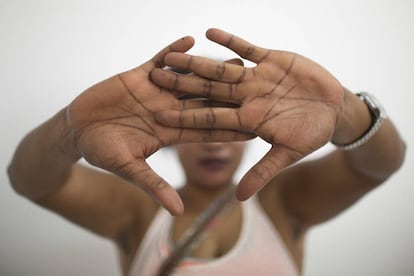Human trafficking
Thousands of women have been rescued in recent years, reflecting the rise of exploitation in Spain

In just five years, Spanish law enforcement agencies have rescued 5,675 victims of human trafficking who were being subjected to sexual exploitation or forced labor. The vast majority were women who were taken from their countries of origin through deception or violence, and once in Spain, forced to work as prostitutes in conditions of slavery.
The police report that revealed these figures shows some incipient results following the implementation of policies to combat human trafficking to Spain, but it also illustrates the scope of a transnational criminal activity that financially already represents nearly as big a business as drug or arms trafficking.
Those who pay to have sex with a woman who is a sexual slave have a share of responsibility
If the 4,500 rescued women and 3,000 arrests made over the last five years represent the tip of the iceberg, as experts claim, then we can deduce the magnitude of the challenge ahead if we are to eradicate this form of slavery and the mafias that profit from it. The Intelligence Center against Terrorism and Organized Crime, which answers to the Spanish Interior Ministry, last year estimated that there were 23,000 women at risk from sexual slavery.
These figures evidence the need to review the resources that are being allocated to fight organized criminals, as well as the legal framework within which prostitution operates. The lack of means to protect both the victims and the people prepared to make complaints plays a role in fostering impunity. Bearing in mind the brutality of these gangs, only guaranteed protection will encourage people to come forward.
It is no coincidence that Spain ranks first in Europe and third in the world after Thailand and Puerto Rico, according to the United Nations, in relative demand for prostitution. This reality encourages the criminals at work in Spain, with considerable potential for corruption tied to money laundering.
The figures show the need to review the resources allocated to fight the mafias
Different studies show how prostitution is still seen as commonplace by Spaniards. It is surprising to find that young men are using brothels with increasing frequency, seeing prostitution as just another form of entertainment. Some countries fine clients. Ever since Sweden first began doing it 18 years ago, seven other countries in Europe, most recently France and Ireland, have adopted different forms of penalizing the men who use prostitutes. This is especially important in cases of forced prostitution. Men who pay to have sex with a woman who is a sexual slave have a share of responsibility, because without clients, there would be no business. It is necessary to open up a debate on this issue.
In a recent reform of section 187 of the Penal Code, the Popular Party (PP) introduced an amendment in the Spanish Senate that encourages procuring. Aside from making money from a prostitute, in order for there to be a crime it is necessary to also have “grievous, disproportionate or abusive conditions” or “a situation of personal or economic vulnerability,” conditions that are difficult to prove.
English version by Susana Urra.
Tu suscripción se está usando en otro dispositivo
¿Quieres añadir otro usuario a tu suscripción?
Si continúas leyendo en este dispositivo, no se podrá leer en el otro.
FlechaTu suscripción se está usando en otro dispositivo y solo puedes acceder a EL PAÍS desde un dispositivo a la vez.
Si quieres compartir tu cuenta, cambia tu suscripción a la modalidad Premium, así podrás añadir otro usuario. Cada uno accederá con su propia cuenta de email, lo que os permitirá personalizar vuestra experiencia en EL PAÍS.
¿Tienes una suscripción de empresa? Accede aquí para contratar más cuentas.
En el caso de no saber quién está usando tu cuenta, te recomendamos cambiar tu contraseña aquí.
Si decides continuar compartiendo tu cuenta, este mensaje se mostrará en tu dispositivo y en el de la otra persona que está usando tu cuenta de forma indefinida, afectando a tu experiencia de lectura. Puedes consultar aquí los términos y condiciones de la suscripción digital.








































